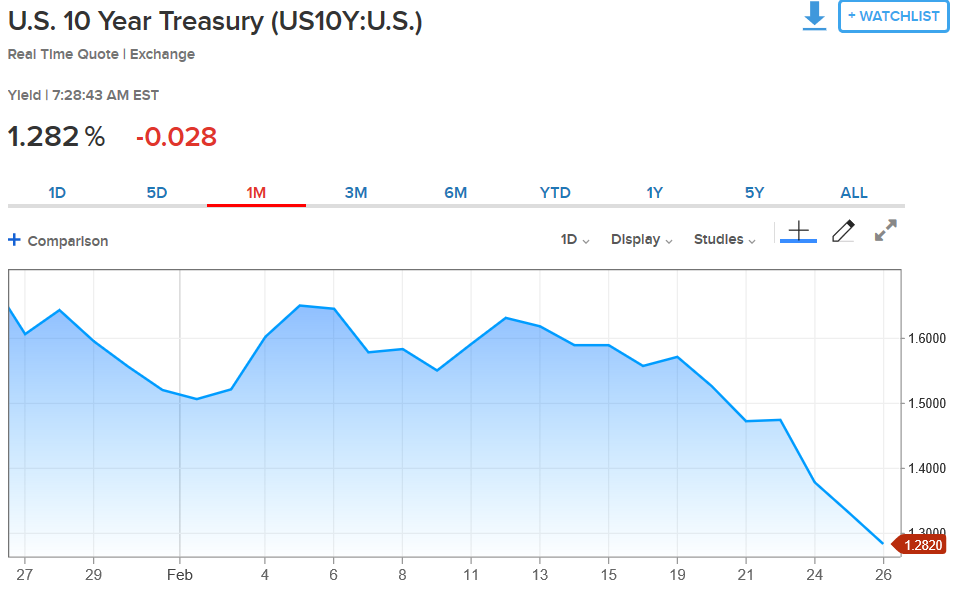For most people who watch the market, this week has been all about stocks. As the fear of coronavirus hits panic level, fueled by breathless media coverage, the S&P 500, Dow and Nasdaq have suffered losses that are nudging the significant ten percent threshold. However, if you listen to market professionals in the financial media, many of them will point to something other than the drop in the major stock indices as a cause for concern. The yield on the 10-Year T-Note is at an all-time low and that, they say, hints at a long-term problem.
Under normal circumstances, a 10 Year that is yielding below 1.3% would indeed be a frightening warning sign for the economy. Conventional wisdom tells us that lower rates indicate that big money is betting on a downturn, buying bonds instead of riskier stocks. However, investors should be asking themselves “Are these normal circumstances?” and “Does conventional wisdom still apply?”

If the answer to both those questions were a definitive “yes,” then the low yields and the downward slope of the yield curve out to around the 10-Year would be big causes for concern, but that isn’t clearly the case. An argument can be made that these are anything but normal circumstances, so we should be rethinking the conventional wisdom.
The obvious departure from the norm here is that the market, along with the rest of the country, is in a fully-fledged panic about a virus. I will say again what I have said before, even though pointing it out has angered some people. The most likely outcome of this virus, like those that have caused a panic before, is that in a fairly short period of time we will have forgotten all about it and moved on to other headline-driven market moves.
The reaction to it will undoubtedly result in some economic slowing that will impact profits. It already has in China where the whole thing started, and in an era of globalization, that cannot help but spread. Coronavirus may even infect a lot of people in a short time, but it is very unlikely to kill more people that the flu does every year, or heart disease, or cancer. The long-term impact on economic growth will probably be effectively zero.
On that basis, it could be argued that there is something else going on with stocks. The fact that this all started from a point where valuations were looking stretched played a part, as did the market’s fear (rational or not) of a Sanders Presidency. Even the coronavirus part of the story is really about the reaction to the virus, not its direct impact,
Similarly, there are reasons other than coronavirus why traders are buying U.S. Treasuries and pushing yields to record lows, and they too are about an anticipated reaction rather than the direct impact of this year’s scary virus.
For good or bad, the Fed has, since the financial crisis and subsequent recession, taken it on itself to respond to every threat to economic growth and market stability in the only way they can: they cut rates. On the perfectly reasonable assumption that they will do so again following this disruption, traders are positioning themselves for a rate cut.
I am not saying that is the only reason for low rates. There is definitely a flight-to-safety aspect to the bond buying, and it is probably also linked to a feeling that stocks had gone beyond their logical valuation, but expectations of a rate cut play a part, and the implications of that for stocks is not all bad in the long run.
Even when the Fed cuts rates for real and obvious reasons, it has the effect over time of pushing money into equities. That is in part why over the past few years, stocks have so often exhibited “v-shaped” recoveries from periods of weakness. As the panic fades, the Fed cuts rates, hastening the recovery.
Judging by bond markets, that pattern is likely to repeat. So, while there is probably more volatility to come as the fear continues, once the turnaround begins, those looking to buy the dip shouldn’t wait too long.
The views and opinions expressed herein are the views and opinions of the author and do not necessarily reflect those of Nasdaq, Inc.

